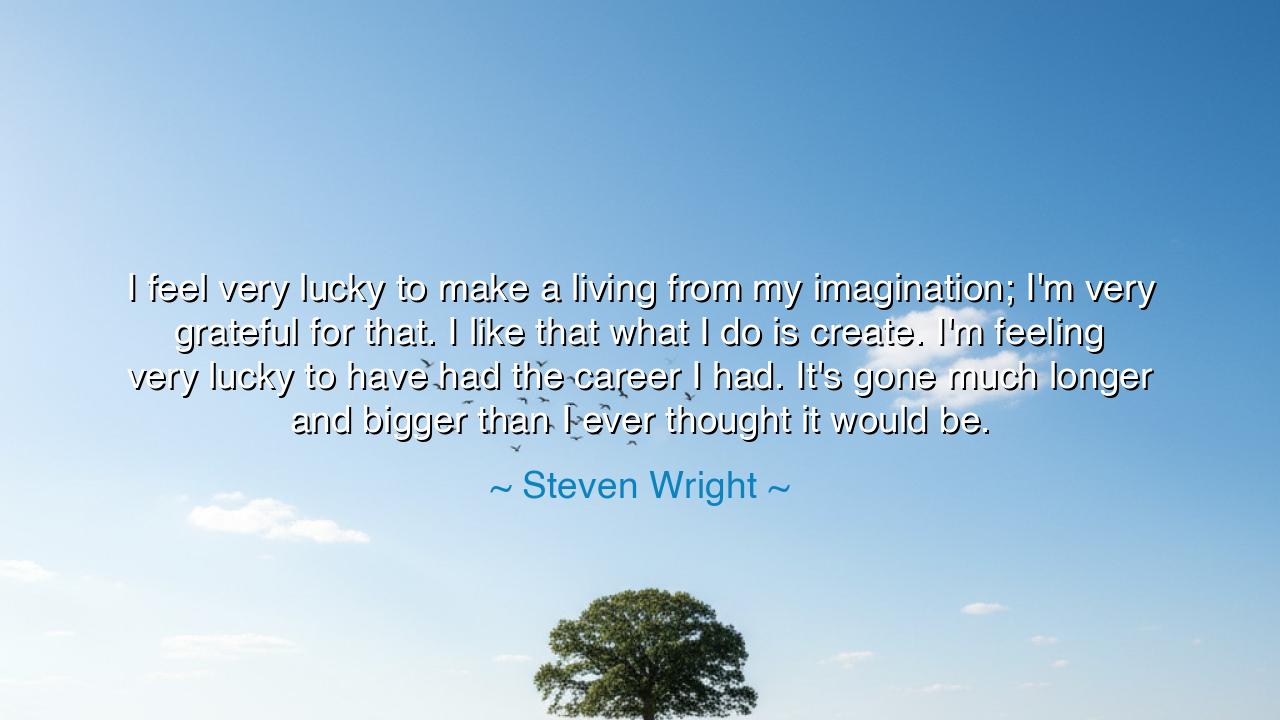
I feel very lucky to make a living from my imagination; I'm very
I feel very lucky to make a living from my imagination; I'm very grateful for that. I like that what I do is create. I'm feeling very lucky to have had the career I had. It's gone much longer and bigger than I ever thought it would be.






In the words of Steven Wright, the quiet philosopher of laughter, there hums a truth both humble and profound: “I feel very lucky to make a living from my imagination; I'm very grateful for that. I like that what I do is create. I'm feeling very lucky to have had the career I had. It's gone much longer and bigger than I ever thought it would be.” Beneath this gentle gratitude lies the eternal wisdom of the creator’s journey — the union of imagination, work, and thankfulness. Wright speaks not as a man who conquered, but as one who received his gift with reverence, knowing that to live from the wellspring of one’s own mind is among life’s highest blessings.
To make a living from imagination is to earn bread from dreams — to shape the invisible into something that feeds both oneself and others. Few achieve this, for the world often rewards conformity more than creativity. Yet those who dare to listen to the inner voice — who follow the whispers of their own vision — find a joy deeper than wealth. For such people, creation is not labor but liberation. They work not to survive, but to express. And in that expression, they touch the eternal, joining the lineage of poets, artists, inventors, and dreamers whose imagination has nourished civilization itself.
The origin of Wright’s words lies in a lifetime of quiet observation. His art — built upon irony, wit, and surreal thought — reveals a man who lives not on the surface of things, but in the strange depths beneath them. He sees the absurdity of life and, through creation, transforms it into laughter. Yet here, in this quote, we see the heart behind the humor — a soul who understands that the power to create is not an entitlement, but a gift. His gratitude speaks to the ancient belief that talent is a flame entrusted to the bearer by something greater than himself, and that one’s duty is to keep it burning with humility and care.
History, too, is filled with such creators who gave thanks for their gifts while transforming the world. Consider Leonardo da Vinci, the painter, engineer, and philosopher of the Renaissance. His imagination was his kingdom, and through it he earned not only his livelihood but his immortality. Yet in his notebooks, he often wrote with awe about the mystery of his own mind — as though his thoughts were not his own, but divine visitations. Like Wright, he understood that the ability to imagine and to create is both blessing and responsibility. For imagination is the river through which eternity flows into the finite world.
To feel grateful for one’s own creation is no small thing. Many who reach success forget the roots of their gift — they mistake talent for ownership rather than stewardship. Wright’s humility restores balance to this truth. He reminds us that even in triumph, the wise remain modest; they see that their path was not walked alone. Behind every work stands the influence of others — mentors, muses, and unseen hands that guided the journey. Gratitude, then, is the final act of creativity: it transforms achievement into wisdom, and success into peace.
Yet there is also courage in what Wright says. For to live by imagination is to live without guarantees. The artist, the thinker, the innovator — all step into the unknown, crafting meaning from uncertainty. To “make a living from imagination” is to trust that the unseen can sustain the seen, that the intangible can nourish the tangible. It is a brave and sacred gamble. But those who take it, as Wright did, discover that life responds to the sincerity of one’s devotion. The world, though harsh, has a way of honoring those who serve their gift faithfully.
So, my child, take this lesson as you walk your own path: be grateful for your imagination, for it is the divine spark within you. Do not waste it on idle dreams, but shape it into works that bring light into the lives of others. Whether your art is in painting, building, teaching, or loving — let it be your creation, your offering to the world. And when success comes, as it may, meet it not with pride, but with humility and wonder, as one who has been entrusted with a rare and holy thing.
For in the end, as Steven Wright teaches, the truest success is not fame or fortune, but the joy of knowing that you have lived by the light of your imagination, that you have created, and that in doing so, you have left a trace of beauty upon the earth. Be thankful for your gift, and use it well — for gratitude is the guardian of greatness, and creation, when born of humility, becomes eternal.






AAdministratorAdministrator
Welcome, honored guests. Please leave a comment, we will respond soon